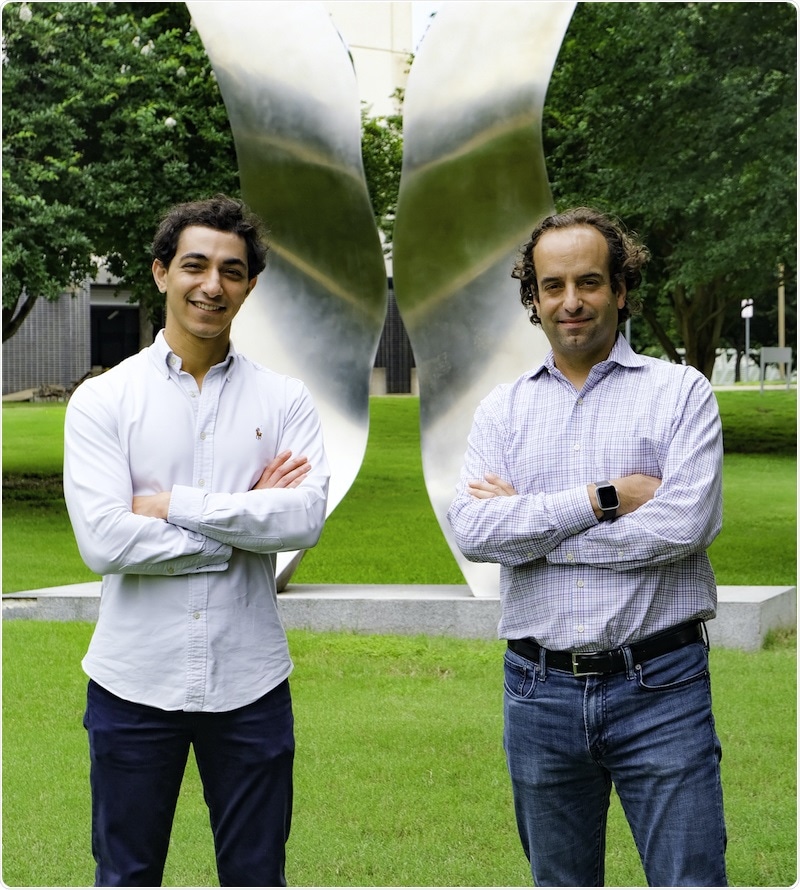Reviewed by Dan Hutchins, M.PhilJun 11 2021
According to a new study, a mechanism through which an RNA, called NORAD, drives the Pumilio protein to create liquid droplets in cells—similar to oil in water—appears to closely control the activity of this protein.

Mahmoud Elguindy, left, and Joshua Mendell, M.D., Ph.D. Image Credit: UT Southwestern Medical Center.
The study, headed by researchers from the UT Southwestern Medical Center (UTSW), indicates that such RNA-driven “phase separation” consequently protects against premature aging, neurological disorders, and genomic instability, and may represent a previously unknown approach for RNAs to govern cellular activities.
It’s becoming more and more clear that phase separation is an important organizing principle in cells.”
Joshua Mendell, MD, PhD, Professor, Molecular Biology and Howard Hughes Medical Institute Investigator, UT Southwestern Medical Center
Mendell has headed the study, which was recently published online in the Nature journal.
Other UTSW scientists, including Michael Rosen, PhD, chair of biophysics and a member of the National Academy of Sciences (NAS) and a Howard Hughes Medical Institute investigator, and Steven McKnight, Ph.D., professor of biochemistry and a member of NAS and the National Academy of Medicine, have previously discovered that phase separation plays a key role in many cellular pathways.
Our work builds upon their findings, uncovering how phase separation enables some RNAs to regulate the activity of proteins that they interact with.”
Joshua Mendell, MD, PhD, Professor, Molecular Biology and Howard Hughes Medical Institute Investigator, UT Southwestern Medical Center
Mendell, along with Mahmoud Elguindy, a Medical Scientist Training Program student from UTSW, discovered this function for phase separation by focusing on an RNA, called “non-coding RNA activated by DNA damage,” or NORAD for short.
Although NORAD does not directly generate proteins, it binds to and suppresses the Pumilio protein that inhibits the expression of hundreds of other messenger RNAs that encode proteins implicated in cell division.
Previous studies from the Mendell group found that lab animals and human cells that were genetically altered to lack the NORAD RNA have an abnormally high level of active Pumilio, which prevents them from keeping a stable number of chromosomes during cell division and thus causes them to age prematurely. On the other hand, mutations that result in too little Pumilio have been associated with neurological disorders in humans.
However, the crucial question of how NORAD controls the Pumilio protein to prevent the disease continued to be elusive. Since NORAD is only one of the hundreds of RNAs bound by Pumilio in the cell, it was not clear how NORAD was able to outcompete these other RNAs to regulate the levels of the active Pumilio.
To solve this question, Mendell and Elguindy employed microscopy to locate the ORAD-Pumilio complexes in cells and they observed that these complexes dotted the inside of the cells, generating their own oil droplet-like structures, distinct from the cytoplasm. They dubbed these complexes “NORAD-Pumilio bodies.”
Additional work revealed that NORAD-Pumilio bodies sequestered almost 50% of the Pumilio in cells, and that phase separation was crucial for concentrating Pumilio in these structures. Pumilio not only bound to many locations on each NORAD molecule, but communications between Pumilio molecules also played a major role in droplet formation.
According to Elguindy, the combination of affinity between RNA and protein molecule offers a strong driving force that isolates Pumilio proteins from the surrounding cellular environment, thus inhibiting them from communicating with other RNAs.
When this phase separation was disrupted, NORAD was no longer able to sequester sufficient Pumilio and this led to chromosomal abnormalities.
While phase separation has been observed in many different settings in cells, the scientific community has debated which cellular activities require this process. Our study showed that in this instance, when you perturb phase separation, there are real consequences.”
Mahmoud Elguindy, Student, Medical Scientist Training Program, UTSW
Mendell added that a deeper understanding of the NORAD-Pumilio system may lead to novel approaches to combat aging symptoms and cure neurodegenerative disorders. Looking for other incidences of phase separation by different RNA molecules may also provide additional insights on how cells control other critical activities.